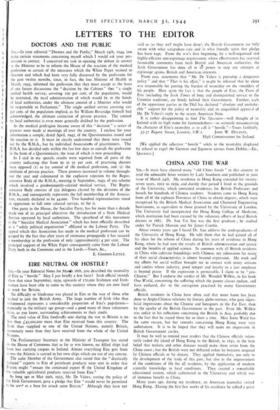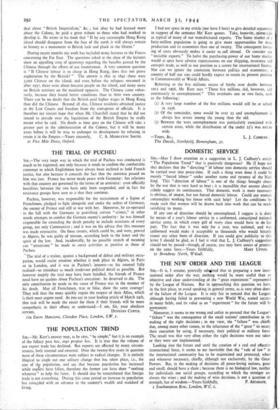CHINA AND THE WAR
SIR,—It must have cheered many "old China hands" in this country to read the admirable letter written by Lady Southorn and published in yonr issue of March 24th. My residence in Hong Kong extended for twenty- seven years, 5912 to 1939, and don't that period I lived in the grounds of the University, which contained residences for British Professors and hostels for hundreds of Chinese students. Students came to Hong Kong from all Of the eighteen Provinces of China to obtain degrees, which were recognised by the British Medical Association and Chartered Engineering Institutions, as equivalent to those granted by the University of London.
The University had incorporated the Hong Kong College of Medicine, which institution had been created by the voluntary efforts of local British doctors in 1887. Dr. Sun Yat Sen was the first graduate ; he studied under Sir Patrick Manson and Sir James Cantlie.
About twenty years ago I heard Dr. Sun address the undergraduates of the University of Hong Kong. He told them that he had gained all of his ideas for the reform of China during his years of residence in Hong Kong, where he had seen the results of British administration and justice and the benefits of applied science. In common with all British residents in China who cultivate friendships with Chinese, my admiration for many_ of their racial characteristics is almost beyond expression. My work anti my efforts for social welfare brought me in contact with many artisans and coolies whose industry, good temper and loyalty to a just employer is beyond praise If the expression is permissible, I claim to be "pro- Chinese." But I endorse the verdict of Mr. Wendell Willkie, in his book One World, concerning the suffering which the poorer classes endure, and have endured, du.. to the corruption practised by many Government officials.
British residents in China have often said that more harm has been done to Anglo-Chinese relations by literary globe-troiters, who gain stiper- ficial impressions about the Chinese and foreigners in the Far East, than by the apathy of the British Government in the past. Even Mr. Willkie was unfair in his reflections concerning the British in Asia, probably due to the fact that he stayed there for so short a time. Miss Irene Ward has the same excuse, but her remarks concerning Hong Kong were very unfortunate. It is to be hoped that they will make no impression in British Government circles.
It may be well to remind your readers that the Chinese officials volun- tarily ceded the island of Hong Kong to the British, in 1841, in the 'firm belief that malaria and other diseases would make them retire from the China coast ; but the British were not defeated either by boycotts inspired by Chinese officials or by disease. They applied themselves, pot only to the development of the trade of this port, but also to the improvement of the conditions of life for all residents, by the application of modern scientific knowledge to local conditions. They created a remarkable educational system, which culminated in the 'University and which was of immense benefit to China.
Many years ago, during my residence, an American journalist visited Hong Kong. During the first few weeks of his residence he talked, a great
deal about "British Imperialism," &c. ; but after he had learned more about the Colony, he paid a great tribute to those who had .worked to develop it. He wrote in his book that "If by any catastrophe Hong Kong island should disappear from the face of the earth it will always remain in history as a monument to British luck and pluck in the Orient."
During recent months my work has included many lectures to the Forces concerning the Far East. The questions asked at the close of the lectures show an appalling state of ignorance regarding the benefits gained by the Chinese through the efforts of our Countrymen. A very common question is "IC Chinese labour is so cheap in Hong Kong, does that not prove exploitation' by the British?" The answer is that in 1841 there were 5,000 Chinese on the island, and even, before the refugees streamed in after 1937, there were about boo,000 people on the island, and many more on British territory on the mainland opposite. The Chinese came volun- tarily, because they found better conditions than in their own country. There can be no doubt that the British paid higher wages in Hong Kong than did the Chinese. Beyond all else, Chinese residents obtained justice in the Law Courts and freedom from the corruption of officials. It is therefore my sincere hope that when Mr. Churchill stated that he did not intend to preside over the liquidation of the British Empire he really meant what he said. No doubt as time goes on the Chinese will take a greater part in the administration of the Colony, but it will be many years before it will be wise to endanger its development by refusing to























 Previous page
Previous page